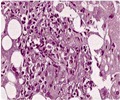Epstein-Barr virus (EBV) that causes glandular fever could also be behind multiple sclerosis, Australian scientists say.
The Epstein-Barr virus (EBV) that causes glandular fever could also be behind multiple sclerosis, Australian scientists say.
Ninety per cent of people carry EBV virus, but those with MS may be unable to control the level of EBV in their brains, a study at the University of Queensland seems to indicate. The EBV-infected B cells tend to accumulate in the brain in such cases, triggering MS, it is theorized.Michael Pender, professor of medicine at the University of Queensland and lead author of the research published in the Journal of Neurology, Neurosurgery and Psychiatry, said the findings were an important step in understanding the cause of MS.
"The significance of our work ... is that it opens that possibility that by controlling EBV infection, either by vaccination or antiviral drugs, we may prevent MS or stop progression of the disease," Professor Pender said.
About 35 per cent to 50 per cent of adolescents and young adults with EBV develop symptoms of glandular fever. There are no vaccines against EBV nor treatments for glandular fever, but both are in development.
They seem to hope that the vaccine being developed to combat glandular fever could save thousands of lives, but others warn the vaccine has not been fully tested as a preventative for multiple sclerosis and does not take into account the influence of environmental and genetic factors.
For people with a parent, child or sibling with multiple sclerosis are at greater risk of contracting the disease.
Advertisement
On the other hand previous studies have shown that people who have never been infected with EBV do not develop MS, and a study last year found the brains of MS patients had abnormally high numbers of EBV-infected cells.
Advertisement
Source-Medindia
GPL/L











